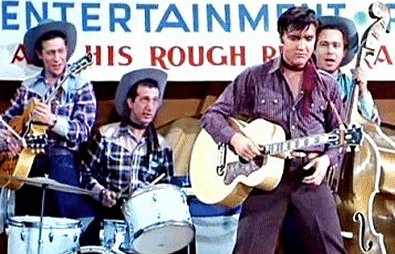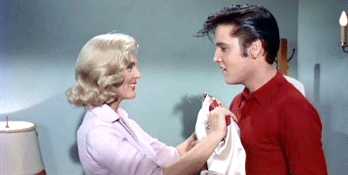Sixties
City presents
a wide-ranging series of
articles on all aspects of the Sixties, penned by the creator of the iconic
60s music paper Mersey
Beat
|
Sixties
City presents
a wide-ranging series of
articles on all aspects of the Sixties, penned by the creator of the iconic
60s music paper Mersey
Beat
|
|||||
|
| Elvis Presley's
second film, 'Loving You', his first in colour, could almost be called 'The
Elvis Presley Story' as it parallels his early career so closely, despite
being based on a work of fiction, 'A Call For Mitch Miller' by Mary Agnes
Thompson which had appeared in the June 1956 issue of the magazine Good
Housekeeping. The script was penned by Herbert Baker and Hal Kanter and
was originally called 'Lonesome Cowboy' before being changed to 'Running
Wild' and, finally, 'Loving You.' Producer Hal Wallis had hired Hal Kanter as both director and screenwriter for the film. Kanter flew to Memphis to spend some time with Elvis, visiting his home and having a meal with his family. Elvis took him on a tour of Memphis, then Kanter accompanied Elvis on some of his gigs where he witnessed the reaction of audiences to the singer. He also noticed a set of twins in the audience who clapped to the music, one twin clapping her right hand to her sister's left. He remembered that incident and hired twins Trude and Maida Severen to perform the hand-clap scene. Elvis had been touring the Southwest just three years before a similar tour was featured in 'Loving You' and some of the scenes were actually taken from real-life incidents which occurred during Elvis' original tour. In the movie Elvis plays Jimmy Tomkins, an orphan who one day comes across a tombstone with the name Deke Rivers on it. He decides to adopt the name and gets a job as a truck driver working in the town of Delville for a beverage distributor, a job not unlike the one he had before he became a professional singer. The young man gets up one night to sing with a band and is spotted by Glenda Markle (Lizbeth Scott), who sees his potential and becomes his manager. She handles him in a Colonel Tom Parker-ish way as Deke does a tour of Texas towns and creates controversy with his wild rock performances. He initially sings with a band led by Tex Warner (Wendell Corey), the Rough Ridin' Ramblers, which features Elvis' own backing band - Scotty Moore, Bill Black and D.J. Fontana. The Jordanaires were also in the film, as were Vernon and Gladys Presley, who were extras in the TV broadcast scene. There is a strong suggestion of a romantic relationship between Deke and his manager, but he eventually falls for Susan Jessup (Dolores Hart), a girl nearer his own age, and Glenda ends up in the arms of Tex. |
 |
 |
Glenda
acts as Deke's Svengali, paying older folks to complain about the singer's
performance and so consolidate the support of the young - which Colonel
Parker had actually done with Elvis. She also continues to develop Deke's
image as a controversial figure, ending in a major TV show which is virtually
a referendum on Deke and his rock'n'roll, similar to Elvis' Ed Sullivan
appearance. There were a number of girls in the movie and Jana Lund, who played Daisy Bricker, became the first actress to share an on-screen kiss with Elvis. Yvonne Lime, who played Sally, dated Elvis and visited him in Memphis while the main love interest, Dolores Hart, Mario Lanza's niece, was also to star as Elvis's girl in 'King Creole' and she later when on to become a nun, declaring "I've done two movies with Elvis Presley. I'd been around Hollywood for a while and saw how needlessly competitive it could be. It never held my interest." In 1997 she began to suffer from the crippling disease Neuropathy, but it didn't prevent her from becoming Reverend Mother Dolores Hart, Prioress of Regina Laudis Abbey in Bethlehem, Connecticut. The film also features some of the King's best numbers in a movie repertoire far more suited to his image than those in his later films. He performs: Got a Lot Of Livin' To Do; Let's Have a Party; Let Me Be Your Teddy Bear; Hot Dog; Lonesome Cowboy; Mean Woman Blues and Loving You. The husky-voiced Lizbeth Scott had appeared in many films since her debut in 'Desert Fury' in 1947, but 'Loving You' was to be her last film, with the exception of a British movie, 'Pulp', made 17 years later. |
|
Article
Text
UK
web hosting by
|